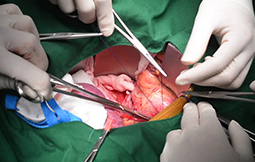
If your kidneys stop working, waste builds up in your body and you may need a kidney transplant, which is a surgical procedure, performed to treat kidney failure.
If your kidneys stop working, waste builds up in your body and you may need a kidney transplant, which is a surgical procedure, performed to treat kidney failure. Kidney failures also known as end-stage renal disease (ESRD), can make you very sick and you may need to get transplantation when your kidneys are close to failure, before you need to start dialysis.
Your kidney filter waste from the blood and remove it from the body through your urine and also help maintain your body’s fluid and electrolyte balance. If a person is facing kidney failure, transplant is considered to be the best treatment option because it can increase patient’s chances of living a longer, healthier life. The
Med X offer access to the best kidney transplant surgeons in India and help you connect with the best specialists to understand all the medical and legal aspects of visiting India for an organ transplant.
Kidney failures also known as end-stage renal disease (ESRD), is the most common symptom for kidney transplantation. Despite the primary cause of this disease, a patient is considered to have arrived at this stage when the glomerular filtration rage is less than 15ml/min/1.73 sq.m. Common symptoms of kidney failure may include–
The pre procedure for kidney transplant start with an organ donor who has died (cadaver), to transplant the kidney the patient is required another kidney and for it the patient is enlisted in the waiting list of the United Network for Organ Sharing (UNOS). General testing is conducted before you can be placed on the transplant list.
Before the transplant procedure, the doctors will ask the patient to get a few tests done to evaluate how well the donor’s kidney matches the patient’s blood and tissue type. In some cases it is not easy that the body easily accepts the new organ but making sure that the patient has a close tissue match benefits in improving the chances of body accepting the new organ.
In India, the patient needs to take several tests before going for actual transplantation that ensures your heart and lungs are free of diseases and there is no significant risk of any serious disease like cancers and other conditions that reduce your lifespan.
A kidney transplant surgery is performed below anesthesia. It usually takes 2-4 hours for this operation to end. The procedure starts by inserting the donor excretory organ in the patient’s lower abdomen then the blood vessels from the donor’s excretory organ are connected to the veins and arteries in the patient’s body. What is more, the donor kidney’s epithelial duct will be connected to the patient’s bladder. This procedure helps to hold blood to the excretory organ and therefore the vein that carries blood away is surgically connected to the artery and vein already existing within the pelvis of the recipient helps the blood to flow through the new excretory organ, permitting it to start out doing its job of filtering and removing waste further on manufacture piddle.
The patient’s already existing excretory organs aren’t sometimes removed unless they’re inflicting severe issues like frequent kidney infections, uncontrollable high vital sign, or are greatly enlarged. It always takes 3-7 days for the patient to recover.
Post your organ transplant surgery you’ll awaken in your hospital room. Hospital employees and doctors can monitor your very important signs till they’re positive you’re awake and stable. Then, they’ll transfer you to a room and closely monitor you for many days. Even if you are feeling fine when your surgery (many individuals do), you’ll seemingly ought to keep within the hospital for up to a week after the surgery. Your new organ could begin to clear waste from the body now when the surgery, or it should take up to many weeks before it starts functioning.
Kidneys given by relations typically begin operating additional quickly than those from unrelated or transplanted from deceased donors. You can expect a decent deal of pain and soreness close to the incision throughout the initial amount of healing. Whereas you’re within the hospital, your doctors can monitor you for any reasonable complications. They’ll place you on a strict schedule of immunosuppressive drug medicine and a few medications to prevent your body from rejecting the new urinary organ. You’ll ought to take medicines each day to stop your body from rejecting the donor urinary organ.
Before when you will take discharge from the hospital, your transplant team will provide you with specific directions on, however, and once to require your medications.
Your doctors also will produce a medical examination schedule for you to follow after your surgery. Once you’re discharged from the hospital, you’ll ought to keep regular appointments together with your doctor so they will evaluate however well your new urinary organ is functioning.
Common risks and complications that can occur with kidney transplant surgery may include:
Copyright © 2025 IMA | All Rights Reserved.